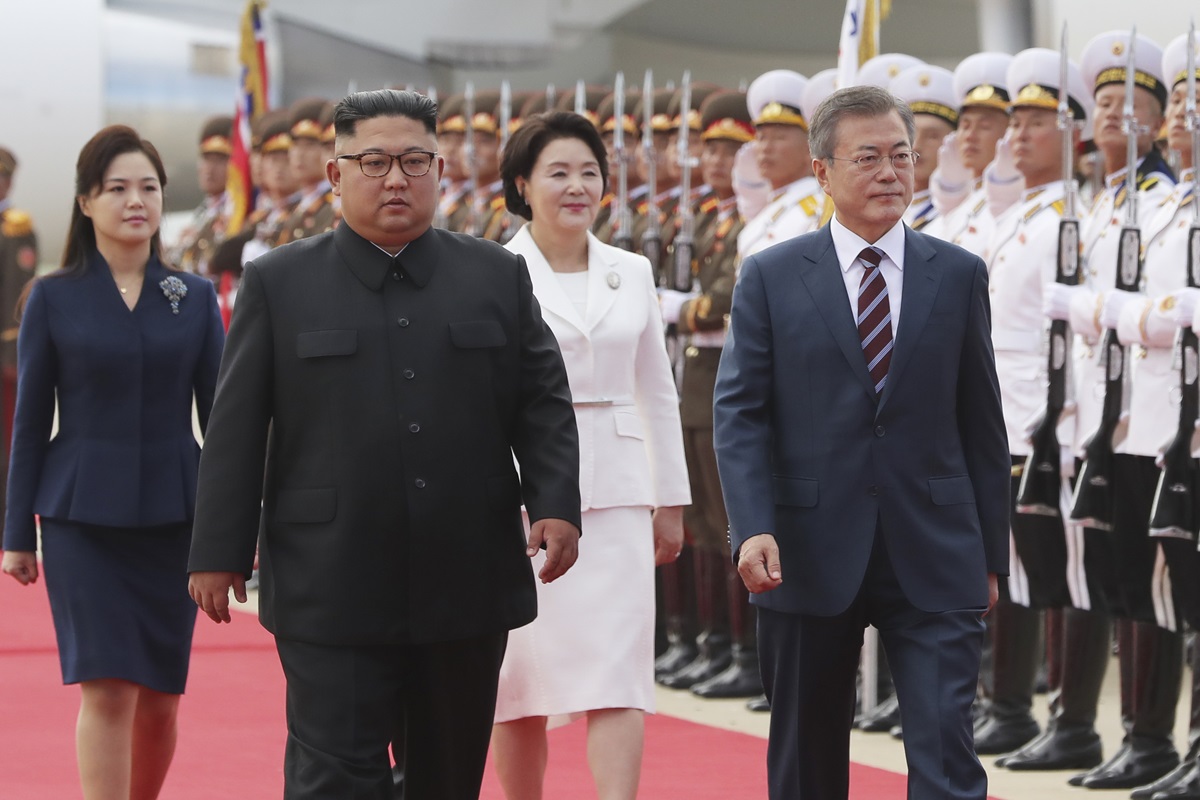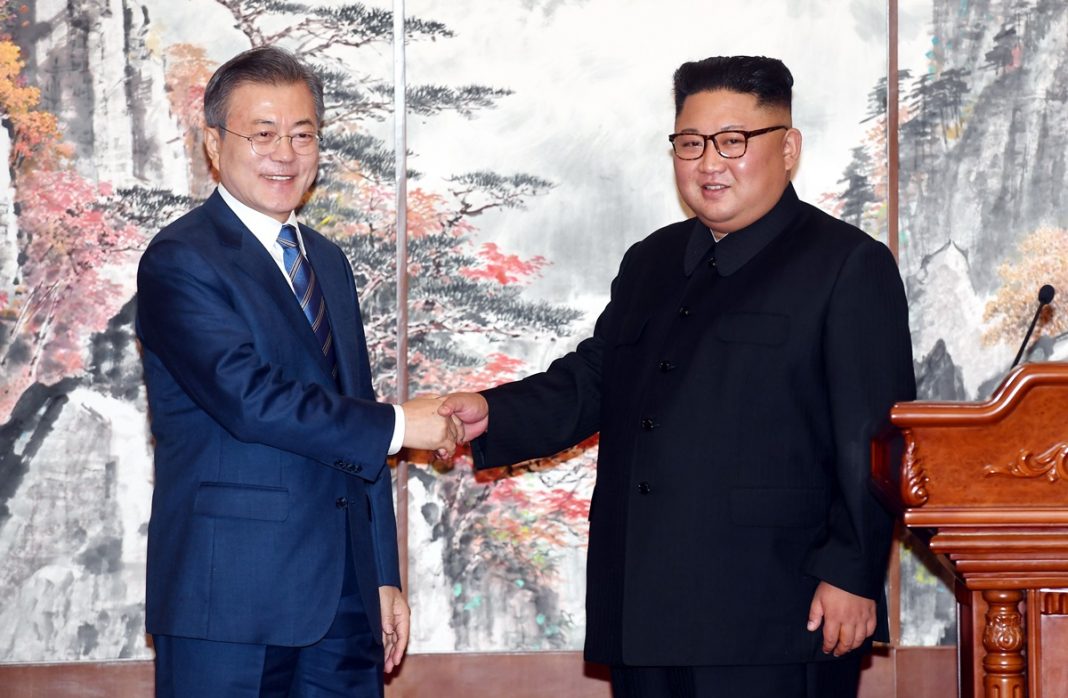A former human rights lawyer as president, the former UN Deputy High Commissioner for Human Rights as foreign minister, and a long-time pro-democracy activist as unification minister; the current ROK government should be a human rights-advocating dream team, right? Wrong.
Despite the backgrounds of many cabinet members, this government’s approach to human rights, particularly concerning North Korea, has been questionable at least and dismal at worst.
Although this government’s main goal since day one has been to improve inter-Korean relations, the way they have gone about achieving this aim has rubbed many the wrong way. Diplomacy is indeed important, but where is the red line?
Diplomacy Above All Else
Human rights groups have long criticized the South Korean government’s stance of putting diplomacy and engagement with North Korea before human rights. Since taking office, President Moon Jae-in has made it his administration’s clear priority to increase engagement with North Korea, no matter what. Although this seemed to yield some positive results in 2018, inter-Korean relations have been more or less stalemated since last year.
Nevertheless, this government has not given up on reaching out to its northern neighbor. Although diplomacy should always be pursued instead of confrontation or conflict, the current South Korean government made some questionable choices this year that have further worsened its record on human rights.

For example, the government did nothing after North Korea blew up the inter-Korean liaison office in June. Things then got worse in September after North Korean soldiers killed a South Korean civil servant at sea. Again, the South Korean government’s response was disappointing to these incidents.
Instead of reprimanding North Korea, the government thanked Kim Jong Un for his apology letter and accused the South Korean man of attempting to defect. The government’s inaction on the matter resulted in a wave of criticism by the victim’s own family, various human rights NGOs, the opposition, and North Korean defectors.
The Perspectives of Defectors
Besides the political opposition, some of the most active voices criticizing the current South Korean government’s human rights record are North Korean defectors. According to a 2020 report by the UN Office of the High Commissioner for Human Rights in Seoul, recent defectors (who defected in 2018-2019) have expressed concerns that Pyongyang’s human rights abuses have been ignored.
Besides just ignoring North Korea’s human rights abuses, however, the South Korean government has actually gone after human rights NGOs. For instance, after the June liaison office incident, South Korea decided to punish many NGOs run by defectors for spreading flyers across the border. “Many of the NGOs have said the crackdown risks stifling the entire North Korean human rights movement in South Korea,” VOA reported at the time.
Besides NGO workers and activists, many defectors on YouTube have also been sharing their views on North Korean human rights.
The following are just a few of the defectors who have spoken out on the issue.
Kang’s perspective is a particularly valuable one given his past experiences concerning human rights: He spent ten years in a labor camp in North Korea before being able to defect to South Korea in 1992. During his time in the camp, he witnessed and experienced unspeakable human rights abuses of all kinds, all recorded in his book “The Aquariums of Pyongyang.”
Kang is a staunch critic of the current Moon Jae-in administration, accusing it of constantly turning a blind eye to North Korea’s human rights abuses and, instead, putting politics above everything. During one of his recent live streams, he once again laid out why many defectors like him are unhappy with the current government’s North Korea policies.
“Not a single word regarding human rights” has ever come out of the mouths of any Democratic Party member or from the Blue House under this current administration, he argued, adding, “This government has proven time and again that they are willing to do anything to keep the opportunity for engagement with North Korea open.”
He also criticized the government for not co-sponsoring the 2019 UN resolution on North Korean human rights and for repeating the same action this year. In the same video, he also accused President Moon of “violating the South Korean Constitution” since, according to Article 3 of the document, South Korea’s territory comprises the entire Korean Peninsula and the South Korean government is therefore responsible for protecting the human rights of all individuals living on the peninsula, including North Koreans. As such, the government has failed in its basic duty of protecting the Korean people, according to Kang.
Another well-known defector, Yeonmi Park, shares this same opinion. Apart from the DPRK government, she argues that South Korea should hold the Chinese government accountable for forcibly repatriating North Korean refugees, as they are technically committing a crime against South Korea too due to the wording in the constitution, she argues.
Lee Hyeon Seung & Lee Seo Hyeon
The Lee siblings offer another interesting perspective among defectors given their elite background in North Korea. Before they defected, they and their family were part of the upper-class in Pyongyang and lived, by North Korean standards, a rather luxurious life. Nevertheless, after witnessing the execution and imprisonment of various friends they defected in 2014.
According to Lee Hyeon Seung, the human rights situation in North Korea deserves much more attention than it is getting. He also mentioned how the North Korean military could only afford to eat around two meals per day before progressive South Korean governments started providing North Korea with food aid in the early 2000s. In effect, this South Korean aid was indirectly helping the North Korean army.

His sister, Lee Seo Hyeon, also says not enough is being done to tackle the human rights issue: “We can’t properly solve the North Korean problem without solving the human rights problem.” They expressed their hope that the incoming Biden administration would put more effort into improving North Korean human rights and change the unconditional engagement policy towards North Korea that has been dominant in the past two years.
Change on the Horizon?
President Moon does not have much time left in office, with general elections scheduled to be held in South Korea in March 2022. With a new president in the White House, South Korea is unlikely to be able to make much progress on inter-Korean relations in such a short period of time.
Although it remains to be seen whether another left-wing government will be elected in South Korea in 2022, there is an opportunity to change North Korea policy under the Biden administration. Both Joe Biden and Kamala Harris have repeatedly criticized the unconditional engagement approach towards North Korea that has been prevalent under Trump and Moon.
One way to show commitment to improving the human rights situation in the DPRK would be if Biden restores the position of special envoy for Special Envoy for North Korean Human Rights Issues. Trump failed to nominate anyone for the position during his time in office. However, given that Biden was the ranking member of the US Senate Committee on Foreign Relations in 2004 – when the North Korea Human Rights Act was first adopted – he is highly likely to nominate someone for the position.
Still, given the pandemic and many other US domestic issues, any progress on North Korean human rights is likely to take some time. Until then, the South Korean government must not forget who it is dealing with up in the North. Kim Jong Un is not your average state leader: He is responsible for countless crimes and does not deserve the amount of grace he has received from this administration.
While diplomacy and engagement are important, there must be a red line. North Korea crossed that line twice this year, yet Seoul continues to refuse to give up on its failing unconditional engagement strategy. For a cabinet full of former pro-democracy and human rights activists, it is indeed sad how little has been done to tackle this issue.
Views expressed in Guest Columns do not necessarily reflect those of Daily NK.
Please direct any comments or questions about this article to dailynkenglish@uni-media.net.





















